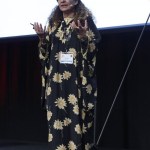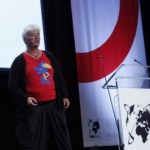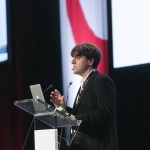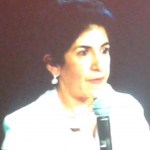guest post
This is a guest posts by Claire Cohen Cortright.
Claire Cohen Cortright is a mother, climate activist, and biology teacher living in upstate New York. She
is an active member of Citizens Climate Lobby and moderator at Global Warming Fact of the Day.
______________________________________________
It is time, now, for climate activists to get vocal.
As it becomes more clear that Hillary Clinton will be the Democratic Party’s nominee for President, there is increasing talk about the importance of unifying the party. Negotiations are on the horizon … for Vice President and for the Party’s…
This is a guest post by Larry Lazar.
If you have had the news on the last day or two you may have seen stories and images about the Missouri floods. Many of those images are from Eureka (where we live), Pacific (where my wife Kellie works) and Valley Park (which is on my commute to work). That picture of the submerged McDonald's you may have seen on the news is in Union, Missouri, about 20 miles to the southwest of Eureka
We are dry, mostly, and doing okay. The basement was flooded during the initial 3 day rain event due to a failed sump pump and a couple downspouts that came unattached from…
The last lecture of the last session was by Cass Sunstein. Sunstein is one of the architects of "nudge" thinking. He is a law professor, but he works with behavioral economists to develop his ideas and policy proposals. He has worked with the Obama government to develop "nudge" policies and his ideas are being copied all over the world, especially in the UK, which has a nudge unit.
Sunstein thinks of the policies he develops as "paternalistic libertarianism," a label that could ruffle more than a few feathers. I think one needs to approach Sunstein and his fellow nudgers with an open…
Yesterday was policy day, as far as keynote speakers were concerned. Lidia Brito is the UNESCO director of science policy and capacity building. Among the usual points about the need to change, building capacity and recognizing stakeholders, here is what I believe is her take home message: Science is changing, and that's a good thing. We need to keep going in this direction, but change it even more.
Collaborations across countries and continents, the rise of science in China and India, and yes, MOOCs. In other words, we need to actively help create equality in science education and science…
Peter Krause, the ever-friendly and patient press officer for ESOF, says the best thing about the organization is that it began ten years ago as a grass-roots idea: scientists who wondered why Europe had no equivalent of the AAAS and decided to create one. Since then, it has grown in all directions, but it still retains the flavor of scientists creating spaces for scientific exchange on a pan-academic level.
That feeling was certainly present yesterday evening, at a session on science communication. The speakers were three communicators in very different fields. The first, Angel…
I have definitely reached information overload, which is unfortunate because I am missing Brian Schmidt's talk. However, of all the things I have heard and seen today, there is one talk I need to write about: Ice cores in Greenland.
Dorthe Dahl-Jensen is one of the most cited scientific authors. period.
Dorthe Dahl-Jensen
That is probably why she can get away with lecturing in this wonderful T shirt.
Dahl-Jensen goes to Greenland with a large team to drill ice cores. And those cores, of course, contain precise records of the climate going back tens and hundreds of thousands of years. From…
The sun came out and I was called out of a session, so I took advantage of the sunshine, after three days of grey and drizzle, to see the outdoor booths set up all around the buildings in the Carlsberg complex, here. In fact, in conjunction with this main festival of science, the city of Copenhagen is hosting a "Science in the City" fair here and all over the city. Here's what I saw:
The point of this 3-D printed head is to create better devices -- eg. hearing aids. Several 3-D printers on display.
Here's my favorite:
They are working on a "family" solar car. Not sure how a family will…
Aside from the actual science, I am learning that 1) Copenhagen can be quite cold in the summer and 2) that the natives here are quite friendly. More than once people on the street have stopped to help me find my way. And the streets are full of people -- walking, riding bikes, taking buses. It seems to be a fitting place to have sessions on urban planning. From what I can see, Copenhagen has adopted some of the better ideas.
After a morning of biology, I went for physics and aerospace in the afternoon. The subject was the Google LunarX prize. To get the $20 million, the winning team…
Today we get to the science and the issues surrounding it. Karl Deisseroth gave the first keynote lecture. For anyone who's been asleep the past few years, Deisseroth's lab at Stanford is at the cutting edge of a new kind of brain research. They invented optogenetics -- turning brain circuits on and off (in mice, at present) with fiberoptic lasers. Their lab is putting out new methodology at an astounding rate. Their latest is Clarity: a way of making the brain tissue clear, so you can see all the neurons at once. In other words, you can get an image of the whole brain. I know I am not the…
Fabiola Gianotti
I should start with the ESOF 2014 opening ceremony, but instead, I need to go back to the rest of the journalists conference. Specifically to the prize - yes there was a prize. It went to a guy with dreadlocks down past his waist who stages science events in Christiania -- the still-existent hippie/anarchist community in the middle of Copenhagen. Among other things, he could talk about deconstructing academic while listing things that suck. Instead of describing, I'll tell you to visit his website: Science and Cocktails (scienceandcocktails.org). (Sorry, the iPad…
Today is the "First" European Science Journalists' Conference. So far, we are in the midst of the usual: Is there a crisis in science journalism? Clearly the business is changing, and those who work for the print media feel the pinch, and yet people have access to more reporting on science than before. Kathryn O'Hara says that we are contracting in a funny way. Again, this blog is a good example. I expect people who already interested in science in some way to be reading it.
The speaker before O'Hara, Jan-Olov Johansson, pointed out that in Sweden, at least, science is rated very high in the…
In less than 24 hours I'll be going through security checks, hoping my stopover in Warsaw will go smoothly. Nothing is packed yet, but the credit card that was eaten by a voracious ATM at the beginning of the week has been replaced, gifts have been purchased for various people, included the couple who will be hosting me for three nights, pants have been hemmed. Still not convinced that the new card will work in Danish machines. My cell phone company has just replaced my trusty old "dumb" phone with a brand new "smart" one in hopes I'll use lots of apps and internet services. That…
What can I say about an event that counts both Carlsberg (as in the brewery) and Nature (the scientific journal) amongst its sponsors? That event will be the EuroScience Open Forum (ESOF) 2014. In just a week, I’ll be stepping out of my little bubble in the Weizmann Institute of Science in Rehovot, Israel, on my way to ESOF 2014, held this year in the big city of Copenhagen. There, I’ll be joining several thousand others, from Nobel laureates to mere journalists in a week-long marathon of science-related events.
I’ll be blogging daily from the week-long science fest. Not to name-drop, but…
[A while back, I received a question from a reader via e-mail.
Dear Beasties:
If you had a mutation in either C4 or C5 which one would be worse... I guess the question is is it more important to have the ability to opsonize or the ability to lyse cells with the MAC complex?
I could have done some digging and given a perfunctory answer, but I decided instead to ask my friend Matt Woodruff, another 3rd year grad student in my program whose lab works on compliment, if he could provide an answer and a bit of background. I think you'll agree it was the right choice.
The Compliment System
by Matt…
Kai Wang is a postdoctoral fellow at the Center for Applied Genomics, Children's Hospital of Philadelphia and an author on numerous genome-wide association studies. He left this lengthy comment as a response to my recent post on this comment by McClellan and King in Cell, and I felt it warranted promotion to a full post (with Kai's permission). For more discussion of the M&K review see also two recent posts by Steve Turner at Getting Genetics Done, and an excellent post from p-ter at Gene Expression.
A similar version of this comment is also published at Getting Genetics…
In this series of three guest posts, lawyers Daniel Vorhaus and Lawrence Moore of the excellent Genomics Law Report provide insight into the intriguing question of what happens to customers' genetic data in the event that a personal genomics company goes out of business. Part II and III of this series will be posted over the next two days.
What Happens if
a DTC Genomics Company Goes Belly Up?
Direct-to-consumer (DTC) genomics
companies are not immune to the current recession. When TruGenetics,
a new player in the DTC genomics space, announced in June that it would
be handing out 10,000…
While I continue my work-induced blog coma, here's a guest post from Luke Jostins, a genetic epidemiology PhD student and the author of the blog Genetic Inference, delivering a fairly scathing critique of a recent whole-genome sequencing paper based on Life Technologies' SOLiD platform.
McKernan et al. 2009. Sequence and structural variation in a human genome uncovered by short-read, massively parallel ligation sequencing using two-base encoding Genome Research DOI: 10.1101/gr.091868.109
In prepublication at the moment is a
paper from the labs of ABI,
makers of the SOLiD sequencing system…
Purcell et al. (2009). Common polygenic variation contributes to risk of schizophrenia and bipolar disorder Nature DOI: 10.1038/nature08185
Neil Walker has been doing a spectacular job of serving up useful information in the comments recently, so I asked him to write the first ever guest post on Genetic Future - something that (as I will be announcing shortly) I intend to do fairly regularly over the next couple of months.
The topic is a paper that has created a rather perplexed buzz recently in the complex disease genetics community: the genome-wide association study (GWAS) for…
Sciencewoman says: Some of readers have been wondering about what life is like for those jobs at primarily undergraduate institutions (PUIs). Alice and I are indubitably unqualified to answer that question, so Kim Hannula of "All of my faults are stress related..." graciously offered to provide some perspective. Kim is an incredibly thoughtful blogger about teaching and about geology, so you should all be reading her.
In the comments on Alice's post about grad students and balanced careers, there was some discussion about working at a primarily undergraduate institution, and questions about…
I's an ego thing, sure, but it's also a handy way of seeing what one did this past year. Here are what I think of as the substantial posts of Evolving Thoughts from 2008. Sorry for the lateness - it's a longish list. I (and my guest blogger) have been real busy this year...
Religion and Creationism
Desecration, blasphemy in public, and manners
Why are there still monkeys?
Can a Christian accept natural selection as true?
Does religion evolve?
The heat of religion
The religious we have always with us
Agriculture and the rise of religion
The origins of agriculture now extended
Darwin, God and…










